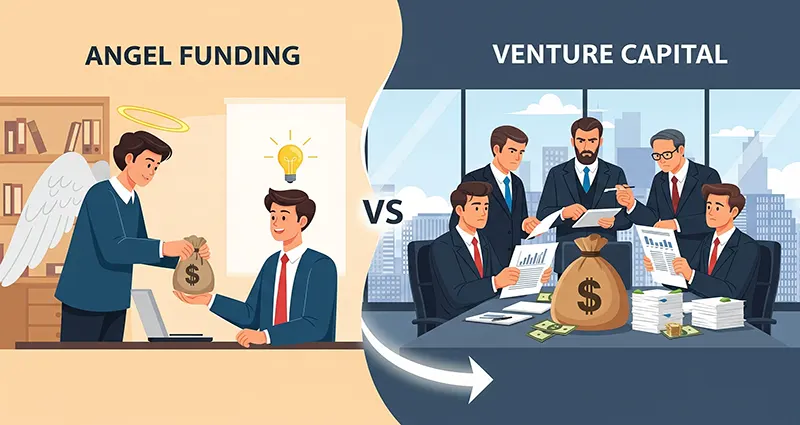For an early-stage startup, securing the right type of funding is a pivotal decision that can shape its entire trajectory. While both angel investors and venture capitalists (VCs) provide crucial capital in exchange for equity, they operate in fundamentally different ways. Understanding these differences is essential for founders to choose the path that best aligns with their company’s vision and goals.
This article breaks down the key distinctions between angel funding and venture capital for early-stage tech startups.
Angel Investors: The First Believers
Angel investors are typically high-net-worth individuals who invest their own personal funds into early-stage companies. The name “angel” comes from Broadway, where wealthy individuals would provide money to save a show from closing. In the startup world, angels are often the very first external investors, acting as a crucial bridge between bootstrapping (using personal savings, friends, and family) and institutional funding.
Key Characteristics of Angel Funding:
- Source of Funds: Angels invest their own money. This gives them more flexibility and often results in a more personal, hands-on relationship with the founder.
- Investment Size: Angel investments are generally smaller, ranging from tens of thousands to a few hundred thousand dollars, and in some cases, up to a million. These funds are used for “seed” activities like building a prototype, conducting market research, and making initial hires.
- Stage of Investment: Angels are most active at the “pre-seed” and “seed” stages. They are willing to take on a higher risk, investing in an idea or a team with minimal to no traction.
- Due Diligence: The due diligence process is often less formal and more streamlined than with VCs. Angels may rely heavily on their personal judgment, the founder’s passion, and the potential of the idea.
- Level of Involvement: Many angels are former entrepreneurs or executives with valuable industry expertise. They often serve as mentors, providing strategic advice and leveraging their personal networks to help the startup grow. The level of involvement can vary, from very hands-on to more passive.
Venture Capital: The Institutional Scaler
Venture capitalists are professionals who manage pooled money from institutional investors like pension funds, university endowments, and large corporations. They invest these funds in high-growth companies in exchange for a significant equity stake. VCs are structured to deploy large sums of capital with the expectation of achieving a massive return on a few successful investments.
Key Characteristics of Venture Capital:
- Source of Funds: VCs invest other people’s money. This means they are accountable to their limited partners and have a fiduciary responsibility to generate a return.
- Investment Size: VC investments are significantly larger, typically starting at a few million dollars and ranging into the tens or even hundreds of millions. These funds are used for scaling the business, such as market expansion, large-scale hiring, and significant product development.
- Stage of Investment: VCs typically invest in “Series A” rounds and beyond, after a startup has demonstrated a product, achieved some level of traction (e.g., strong user growth or revenue), and proven its business model.
- Due Diligence: The process is rigorous and comprehensive. VCs conduct a deep dive into every aspect of the business, including market analysis, financials, team background, and legal structures.
- Level of Involvement: VCs almost always take a more active, hands-on role. They often require a board seat and have a say in major strategic decisions. Their value-add includes providing access to an extensive network of industry contacts, recruiting top talent, and offering strategic guidance to scale the company.
Which is Right for Your Startup?
The choice between angel funding and venture capital largely depends on the stage of your company and your goals.
- Choose Angel Funding If: You are at the earliest stages with a concept, a prototype, or minimal traction. You need capital to validate your idea and build a foundation. You value a more personal relationship with an investor who can act as a mentor. You want to give up less equity and maintain more control in the beginning.
- Choose Venture Capital If: You have a proven business model and clear evidence of product-market fit. You need a large sum of capital to scale rapidly and dominate your market. You are willing to cede a significant portion of equity and control in exchange for the resources, network, and institutional support of a professional firm.
In many cases, the two funding options are not mutually exclusive. A common path for a tech startup is to raise a small angel round to get the business off the ground, use that capital to achieve key milestones and demonstrate traction, and then leverage those successes to attract a larger venture capital round.










